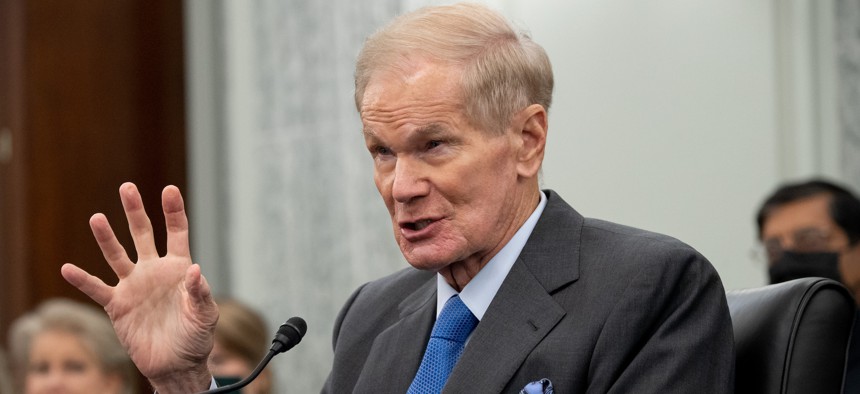
Former NASA administrator Bill Nelson speaks during a hearing on Capitol Hill on April 21, 2021. He recently criticized the Trump administration's cuts to federal science agencies. Saul Loeb-Pool/Getty Images
Former federal science leaders warn Trump proposals could cripple U.S. research
Experts decried potential rescissions of funding for science agencies as well as cuts to government researchers and grants.
Bill Nelson, a former Democratic senator from Florida and NASA administrator under President Joe Biden, began his remarks at a Capitol Hill press conference on Monday in opposition to the Trump administration’s cuts to federal science spending and staff by acknowledging an "Emergency Exit Only” placard on the door behind the lectern.
“This sign says it,” he said. “We’re in an emergency.”
In the wake of Congress passing a bill to claw back $9 billion that lawmakers previously approved for foreign assistance and public media, Nelson singled out a reported possible second recissions measure targeting $30 billion in funding at the EPA, National Oceanic and Atmospheric Administration, National Science Foundation and the Interior and Health and Human Services departments.
“The sword of Damocles holding over everybody’s head is to what degree will there be a rescission package,” he said.
Speakers at the event, which featured a person dressed up in a space suit and was put on by the Protect Science and American Innovation campaign, swore to push back on funding reductions at federal science agencies. They argued that the Trump administration’s actions and plans would weaken U.S. competitiveness and imperil potentially lifesaving research.
“There's a thought that there's going to be a lot more cuts in science, and those cuts have significant long-term consequences. But we're going to keep fighting, and Congress can change this,” said Sen. Mark Kelly, D-Ariz., to a smattering of applause.
Nelson expressed some optimism that he attributed to House and Senate appropriators rejecting the president’s request to cut NASA’s fiscal 2026 budget by 24%. The House bill to fund NASA would maintain its current level of $24.8 billion, while the Senate measure would increase it to $24.9 billion.
A similar phenomenon is playing out with other science agencies.
Trump requested $4.5 billion for NOAA, while House appropriators would give it $5.8 billion and senators provided $6.1 billion. Likewise, NSF would receive $9 billion under the Senate bill and $7 billion under the House measure compared with the president’s $3.9 billion request.
Still, speakers at the news conference expressed concerns about cuts the Trump administration is already making to agency workforces and grants.
Kelly, a former astronaut, highlighted a report from Politico that at least 2,145 high-ranking NASA employees have accepted a separation incentive as part of Trump’s push to shrink the federal employee headcount.
“I'm worried about the budget cuts and the mass layoffs at NASA,” he said. “Trump is showing 2,000 people — experienced scientists, engineers, managers — showing them the door at NASA.”
Alondra Nelson, who was the acting director of the White House Office of Science and Technology Policy under Biden, referenced data from Grant Watch, a project that tracks National Institutes of Health and NSF grant terminations, that found funding for 1,650 NSF grants and 3,500 NIH grants has ended or been paused.
“We have to say clearly what this is, and it is the systematic dismantling of the research infrastructure that has been the cornerstone of American prosperity and competitiveness — the very foundation that has supported our communities for generations, even when we didn't realize it,” she said, noting that smartphones, weather forecasts and GPS all have origins in federal research.
Kelly also emphasized that it’s not easy to restart research once it’s been canceled.
“We've got these long-term investments and decades of data that could just get shut down, it evaporates, it goes to some box in a closet somewhere, somebody hits delete on the file, and it's over,” he said. “We've dedicated millions and millions of dollars and people's entire careers, and this will end when they cut the funding to their programs.”
The White House did not respond to a request for comment.
Nearly 340 current and former NASA employees recently signed a letter to the Trump administration opposing cuts to the agency, writing that they would “waste public resources, compromise human safety, weaken national security and undermine the core NASA mission.”
Approximately 140 EPA employees were put on leave for signing a similar letter to their agency’s leadership.
Bill Nelson, who is also a former astronaut, contended that the workforce reductions at these agencies would deter employees from speaking up about problems, which he noted was a factor in the Challenger disaster.
“When you go about firing people like this administration has — cutting their budgets, eliminating their laboratories — what you do and what they have created is a workplace of fear and intimidation,” he said. “That is the antithesis to safety. Safety is absolutely essential for an organization like NASA, which puts people's lives on the line.”
Share your newstips with us:
Sean Michael Newhouse: snewhouse@govexec.com, Signal: seanthenewsboy.45
NEXT STORY: OMB memo lays out GSA's plan to consolidate contracts







